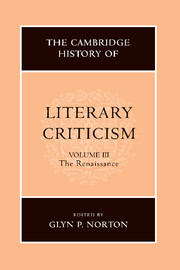Book contents
- Frontmatter
- Introduction
- READING AND INTERPRETATION: AN EMERGING DISCOURSE OF POETICS
- 1 Theories of language
- 2 Renaissance exegesis
- 3 Evangelism and Erasmus
- 4 The assimilation of Aristotle's Poetics in sixteenth-century Italy
- 5 Horace in the sixteenth century: commentators into critics
- 6 Cicero and Quintilian
- POETICS
- THEORIES OF PROSE FICTION
- CONTEXTS OF CRITICISM: METROPOLITAN CULTURE AND SOCIO-LITERARY ENVIRONMENTS
- VOICES OF DISSENT
- STRUCTURES OF THOUGHT
- NEOCLASSICAL ISSUES: BEAUTY, JUDGEMENT, PERSUASION, POLEMICS
- A SURVEY OF NATIONAL DEVELOPMENTS
- Bibliography
- Index
- References
3 - Evangelism and Erasmus
from READING AND INTERPRETATION: AN EMERGING DISCOURSE OF POETICS
Published online by Cambridge University Press: 28 March 2008
- Frontmatter
- Introduction
- READING AND INTERPRETATION: AN EMERGING DISCOURSE OF POETICS
- 1 Theories of language
- 2 Renaissance exegesis
- 3 Evangelism and Erasmus
- 4 The assimilation of Aristotle's Poetics in sixteenth-century Italy
- 5 Horace in the sixteenth century: commentators into critics
- 6 Cicero and Quintilian
- POETICS
- THEORIES OF PROSE FICTION
- CONTEXTS OF CRITICISM: METROPOLITAN CULTURE AND SOCIO-LITERARY ENVIRONMENTS
- VOICES OF DISSENT
- STRUCTURES OF THOUGHT
- NEOCLASSICAL ISSUES: BEAUTY, JUDGEMENT, PERSUASION, POLEMICS
- A SURVEY OF NATIONAL DEVELOPMENTS
- Bibliography
- Index
- References
Summary
The publication of an emended Greek text of the New Testament with a parallel Latin translation in 1516 established Erasmus as the premier evangelical humanist. The Complutensian Polyglot Bible was the first such printed, although it was not published until 1520 for lack of a licence. It was an unprincipled edition by competent philologists but religious conservatives, who subordinated their linguistic skills to ecclesiastical orthodoxy and the Vulgate version. Erasmus's edition secured the approval of Pope Leo X, the prestige of Johann Froben's press, and the applause of learned readers. Lorenzo Valla had inaugurated philological scholarship with corrections to the Vulgate edition. Erasmus surpassed all predecessors in Greek textual criticism, establishing the text that would dominate New Testament studies until the nineteenth century. He would issue four revisions. Scripture was to be correct, Erasmus insisted in a methodological preface, for ‘the theologian derives his name from divine oracles, not from human opinions’.
Countering the speculative and controversial scholasticism that prevailed, Erasmus would provide knowledge of the original sources of theology as his principal purpose. As he outlined his method, by collating variants of the Greek New Testament he produced what he considered the definitive text. Although he consulted manuscripts broadly, he relied consistently only on several, unwittingly not the best available, but only determined so in modern research. Erasmus advanced beyond dependence on New Testament manuscripts, however, by appropriating patristic citations as sources of Scripture. Methodically he identified confused homonyms, corrupt assimilations, and intentional changes. Erasmus invented the principle of the harder reading, and explored inference and even conjecture in reconstructing the text.
- Type
- Chapter
- Information
- The Cambridge History of Literary Criticism , pp. 44 - 52Publisher: Cambridge University PressPrint publication year: 1999

